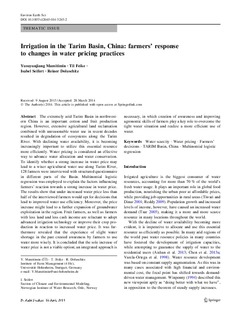| dc.contributor.author | Mamitimin, Yusuyunjiang | |
| dc.contributor.author | Feike, Til | |
| dc.contributor.author | Seifert, Isabel | |
| dc.contributor.author | Doluschitz, Reiner | |
| dc.date.accessioned | 2014-08-06T13:08:04Z | |
| dc.date.accessioned | 2014-10-22T09:25:45Z | |
| dc.date.available | 2014-08-06T13:08:04Z | |
| dc.date.available | 2014-10-22T09:25:45Z | |
| dc.date.issued | 2014 | |
| dc.identifier.citation | Mamitimin, Y., et al., 2014. Irrigation in the Tarim Basin, China: farmers’ response to changes in water pricing practices. Environmental Earth Sciences 1-11. http://dx.doi.org/10.1007/s12665-014-3245-2 | nb_NO |
| dc.identifier.issn | 1866-6280 | |
| dc.identifier.uri | http://hdl.handle.net/11250/224263 | |
| dc.description.abstract | The extremely arid Tarim Basin in northwestern China is an important cotton and fruit production region. However, extensive agricultural land reclamation combined with unreasonable water use in recent decades resulted in degradation of ecosystems along the Tarim River. With declining water availability, it is becoming increasingly important to utilize this essential resource more efficiently. Water pricing is considered an effective way to advance water allocation and water conservation. To identify whether a strong increase in water price may lead to a wiser agricultural water use along Tarim River, 128 farmers were interviewed with structured questionnaire in different parts of the Basin. Multinomial logistic regression was employed to explain the factors influencing farmers’ reaction towards a strong increase in water price. The results show that under increased water price less than half of the interviewed farmers would opt for decisions that lead to improved water use efficiency. Moreover, the price increase might lead to a further expansion of groundwater exploitation in the region. Fruit farmers, as well as farmers with less land and less cash income are reluctant to adopt advanced irrigation technology or improve their crop production in reaction to increased water price. It was furthermore revealed that the experience of slight water shortage in the past created awareness by farmers to use water more wisely. It is concluded that the sole increase of water price is not a viable option; an integrated approach is necessary, in which creation of awareness and improving agronomic skills of farmers play a key role to overcome the tight water situation and realize a more efficient use of water. | nb_NO |
| dc.language.iso | eng | nb_NO |
| dc.publisher | Springer | nb_NO |
| dc.relation.uri | http://link.springer.com/article/10.1007%2Fs12665-014-3245-2 | |
| dc.rights | Attribution 3.0 Unported (CC BY 3.0) | * |
| dc.rights.uri | https://creativecommons.org/licenses/by/3.0/ | * |
| dc.rights.uri | https://s100.copyright.com/AppDispatchServlet?publisherName=Springer&orderBeanReset=true&orderSource=SpringerLink&author=Yusuyunjiang+Mamitimin&AuthorEmail=Y.Mamitimin%40uni-hohenheim.de&licenseType=CC+BY&contentID=10.1007%2Fs12665-014-3245-2&openAccess=true&endPage=11&publicationDate=2014&startPage=1&title=Irrigation+in+the+Tarim+Basin%2C+China%3A+farmers%E2%80%99+response+to+changes+in+water+pricing+practices&imprint=The+Author%28s%29&publication=1866-6280&authorAddress=Stuttgart%2C+Germany | |
| dc.title | Irrigation in the Tarim Basin, China: farmers’ response to changes in water pricing practices | nb_NO |
| dc.type | Journal article | nb_NO |
| dc.type | Peer reviewed | nb_NO |
| dc.date.updated | 2014-08-06T13:08:04Z | |
| dc.rights.holder | The authors | |
| dc.source.journal | Environmental Earth Sciences | nb_NO |
| dc.identifier.doi | 10.1007/s12665-014-3245-2 | |
| dc.identifier.cristin | 1131856 | |

